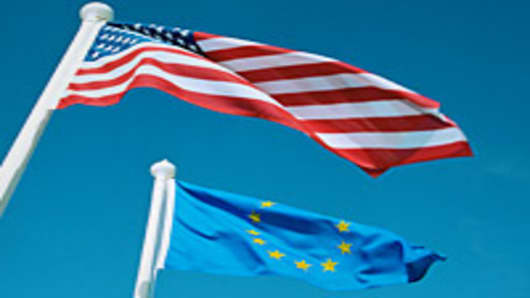A new survey of chief financial officers finds that confidence in the global economy is on the rise, but there is a discrepancy between European and American CFOs when it comes to individual businesses’ confidence and expectations.
Financial Executives International and Baruch College’s Zicklin School of Business conducted a quarterly survey of CFOs from both public and private businesses in the U.S. and parts of Europe (Italy and France).
The CFO Outlook Survey finds that, on a global macro level, CFOs are increasingly optimistic.
On average, confidence in the global economy rose for the 238 CFOs surveyed in the United States, and the 123 CFOs surveyed from Italy and France.
The index measuring the European CFOs’ confidence in the global economy — based on a 0-100 scale, with 0 being the least optimistic and 100 being the most optimistic — jumped five points to 51.8 from its survey-low in November 2011. In the U.S., CFO confidence rose slightly to 46.1 from 45.50 in the previous quarter. Notably, U.S. CFO’s confidence in the U.S. economy was way up — gaining 6 points to reach 57.1.
Still, domestic growth was a source of anxiety for CFOs across the globe. Forty-eight percent of American and European CFOs ranked growth in their home country their number one or two economic concern.
On the micro level, revenue growth ranked as business challenge number one for the first half of the year, according to the CFOs surveyed. Expense control, demand, and competition were the runners up, sequentially.
CFOs’ optimism in their own businesses waned in Europe in the fourth quarter, and grew marginally for their American counterparts. The fourth quarter 2011 optimism index for European CFOs toward their own businesses decreased to 57.6 from 61 in the previous quarter — in the U.S. confidence rose to 67.60 from 67.30.
John Elliott, Dean of the Zicklin School of Business at Baruch College, says that the difference in expectations between European and U.S. CFOs is much larger than seen previously. “U.S. CFOs have noticeably higher growth expectations around their businesses than do their European counterparts.”
He points out that, “in Europe, the CFOs are looking for very modest growth in earnings,” adding that CFOs in the U.S., on the other hand, are expecting revenue growth in the double digits, with net earnings projections of 13 percent over the next 12 months, on average.
Surprisingly, when it comes to the crisis in Europe, U.S. CFOs are more concerned about the future of the euro zone. Based on a scale of one to five, one being not concerned and five being very concerned about the fate of the euro zone, 93 percent of U.S. CFOs selected three or higher — 73 percent of the European CFOs surveyed assigned a three or higher.
Of the CFOs surveyed, 30 percent from Europe feel that the European Central Bank holds the primary ability to produce a lasting solution to the Euro-crisis, compared to 26 percent who believe Germany can produce the solution. U.S. CFOs were more likely to believe that the primary ability lies in Germany (33 percent) versus the European Central Bank(17 percent).
Dean Elliott concedes that the regional difference in opinion on who would be best suited to produce a solution for the European debt crisis is difficult to ascertain. He speculates that U.S. CFOs, as outsiders, are more likely to look to individual countries and leaders as a source of guidance.
European CFOs, on the other hand, are more attuned to the euro zone as a unified whole, and thus place more responsibility on the ECB, Elliott added.
Differences in the outlook of unemployment also heavily influenced CFO business confidence. On average, CFOs in Europe were found to expect unemployment rates to increases substantially in the next 12 months, reaching 12 percent within a year. Alternatively, U.S. CFOs expect the unemployment rate in the U.S. to decrease to 8.1 percent a year from now.



